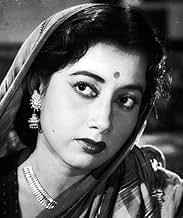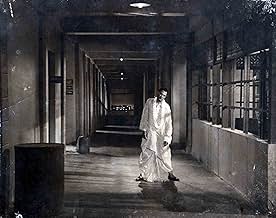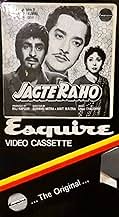Jagte Raho
- 1956
- 2 h 33 min
AVALIAÇÃO DA IMDb
8,1/10
1,1 mil
SUA AVALIAÇÃO
Adicionar um enredo no seu idiomaAn innocent guy who has arrived from a village to Kolkata gets himself involved into trouble in search of water after he gets thirsty in the middle of the night.An innocent guy who has arrived from a village to Kolkata gets himself involved into trouble in search of water after he gets thirsty in the middle of the night.An innocent guy who has arrived from a village to Kolkata gets himself involved into trouble in search of water after he gets thirsty in the middle of the night.
- Prêmios
- 1 vitória e 1 indicação no total
Pahadi Sanyal
- Shashan - Meenu's husband
- (as Pahari Sanyal)
Sulochana Chatterjee
- Meenu
- (as Sulochana Chaterjee)
Iftekhar
- Chandu (Leader)
- (as Iftikhar)
Moni Chatterjee
- Baral Babu
- (as Moni Chaterjee)
Enredo
Você sabia?
- CuriosidadesA shortened version of the film won the Crystal Globe Grand Prix at the Karlovy Vary International Film Festival in Czechoslovakia in 1957.
- ConexõesReferenced in India: Matri Bhumi (1959)
- Trilhas sonorasZindagi Khawab Hai, Khvaab Me Jhuth Kya Aur Bhala Sach Hai Kya
Sung by Mukesh
Avaliação em destaque
Jagte Raho is one of the most amazing classics of Indian cinema. It is sad, comic, tragic, humorous, authentic, educative and entertaining. This magnificent social dramedy relates the story of one poor and innocent peasant who comes to the big city of Bombay in hopes of improving his life. However, while looking for some water to quench his thirst, he is constantly branded a thief by the citizens of the city and chased like a criminal. Looking for a hideout, still thirsty and hungry, he enters an apartment building, running from one flat to another, and ironically, every flat he hides in, he meets different "elite" citizens, all of whom can be easily called thieves.
The film shows the double standards of our society, the cruelty and the corruptness, but not in a stereotypical way. It is natural and real. This naive peasant represents the simple common man who becomes a victim for no fault of his own, not only in India but in the entire world. He encounters different sorts of thefts and crimes committed by those so-called "respectable" citizens of the city, those who call him a thief and chase him just because he yearns for a few drops of water so that they can hide their own misdemeanors. This is so unbelievable yet so true.
Raj Kapoor is the film's main protagonist and may I say, this is one of the finest works of his career, both as a filmmaker and particularly as an actor. The fear in his eyes is so haunting. You really feel for him as you witness his pain, his thirst, his misery, his innocence and his helplessness. The film's final scenes are absolutely fantastic. Kapoor's outburst on the roof of the building in front of the entire nation as he reproaches them for their inhumanity is well-done.
The next two scenes are the film's final and finest. The first, when he gets onto the porch of another flat where he meets the cute-as-a-button Daisy Irani is heart-breaking. Irani's five-minute role of a kind-hearted, joyful and fearless little girl (which is contrary to the rest of the building's residents) who motivates the peasant to exit the building and face the people, is very memorable. There starts the film's best song, "Jago Mohan Pyaare" and we meet a young woman played by Nargis. The graciousness in her eyes and the brief, wordless interaction between Kapoor and Nargis create a magical, unforgettable scene which brings to a beautiful ending. See the film to understand how beautiful it is. This truly is an extraordinary picture.
The film shows the double standards of our society, the cruelty and the corruptness, but not in a stereotypical way. It is natural and real. This naive peasant represents the simple common man who becomes a victim for no fault of his own, not only in India but in the entire world. He encounters different sorts of thefts and crimes committed by those so-called "respectable" citizens of the city, those who call him a thief and chase him just because he yearns for a few drops of water so that they can hide their own misdemeanors. This is so unbelievable yet so true.
Raj Kapoor is the film's main protagonist and may I say, this is one of the finest works of his career, both as a filmmaker and particularly as an actor. The fear in his eyes is so haunting. You really feel for him as you witness his pain, his thirst, his misery, his innocence and his helplessness. The film's final scenes are absolutely fantastic. Kapoor's outburst on the roof of the building in front of the entire nation as he reproaches them for their inhumanity is well-done.
The next two scenes are the film's final and finest. The first, when he gets onto the porch of another flat where he meets the cute-as-a-button Daisy Irani is heart-breaking. Irani's five-minute role of a kind-hearted, joyful and fearless little girl (which is contrary to the rest of the building's residents) who motivates the peasant to exit the building and face the people, is very memorable. There starts the film's best song, "Jago Mohan Pyaare" and we meet a young woman played by Nargis. The graciousness in her eyes and the brief, wordless interaction between Kapoor and Nargis create a magical, unforgettable scene which brings to a beautiful ending. See the film to understand how beautiful it is. This truly is an extraordinary picture.
- Peter_Young
- 29 de jan. de 2010
- Link permanente
Principais escolhas
Faça login para avaliar e ver a lista de recomendações personalizadas
Detalhes
- Tempo de duração2 horas 33 minutos
- Cor
- Mixagem de som
- Proporção
- 1.37 : 1
Contribua para esta página
Sugerir uma alteração ou adicionar conteúdo ausente

Principal brecha
By what name was Jagte Raho (1956) officially released in Canada in English?
Responda



























